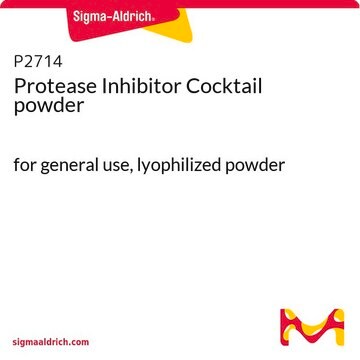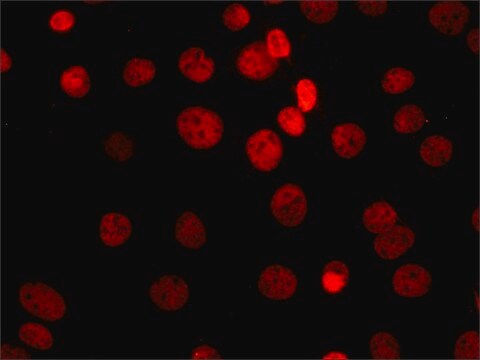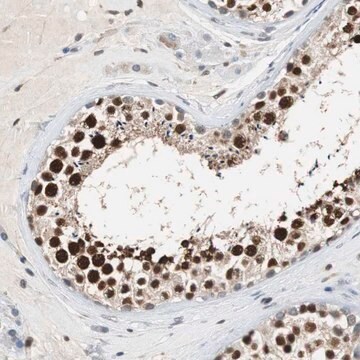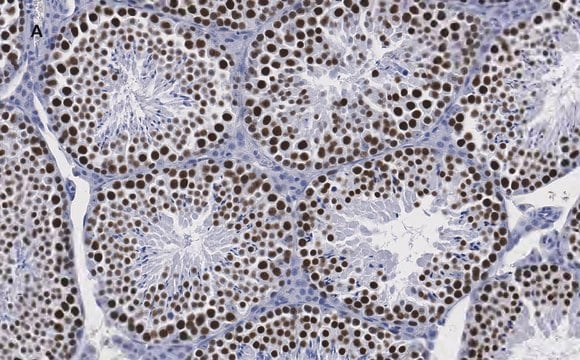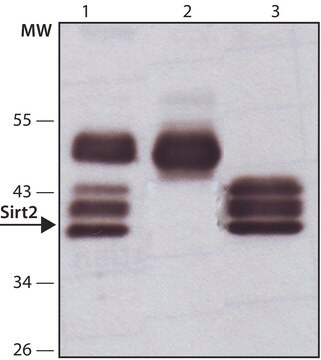07-131
Anti-Sirt1(Sir2) Antibody
Upstate®, from rabbit
Synonym(s):
SIR2-like protein 2, silencing information regulator 2-like, silent information regulator 2, sir2-related protein type 2, sirtuin (silent mating type information regulation 2 homolog) 2 (S. cerevisiae), sirtuin (silent mating type information regulation
About This Item
Recommended Products
biological source
rabbit
Quality Level
antibody form
affinity purified immunoglobulin
antibody product type
primary antibodies
clone
polyclonal
purified by
affinity chromatography
species reactivity
human, mouse
manufacturer/tradename
Upstate®
technique(s)
ChIP: suitable
immunocytochemistry: suitable
immunoprecipitation (IP): suitable
western blot: suitable
isotype
IgG
NCBI accession no.
UniProt accession no.
shipped in
dry ice
target post-translational modification
unmodified
Gene Information
human ... SIRT1(23411)
mouse ... Sirt1(93759)
General description
Specificity
Immunogen
Application
5 µL of a previous lot of this antibody has been shown to immunoprecipitate Sirt1 from 1 mg of a 3T3/A31 RIPA cell extract.
Immunocytochemistry:
This antibody has been reported to detect Sirt1 in 3T3 cells fixed with paraformaldehyde.
Chromatin Immunoprecipitation:
Published by Tiberi et al., (2012)
Epigenetics & Nuclear Function
Histones
Quality
Western Blot Analysis:
A 1:1000-1:5000 dilution of this lot detected Sirt1 in a 3T3 nuclear extract.
Target description
Linkage
Physical form
Storage and Stability
Handling Recommendations: Upon receipt, and prior to removing the cap, centrifuge the vial and gently mix the solution. Aliquot into microcentrifuge tubes and store at -20°C.
Avoid repeated freeze/thaw cycles, which may damage IgG and affect product performance.
Note: Variability in freezer temperatures below -20°C may cause glycerol containing solutions to become frozen during storage.
Analysis Note
Jurkat cell lysate, human colon carcinoma or human lung squamous carcinoma.
Other Notes
Legal Information
Disclaimer
Not finding the right product?
Try our Product Selector Tool.
recommended
Storage Class Code
10 - Combustible liquids
WGK
WGK 1
Regulatory Listings
Regulatory Listings are mainly provided for chemical products. Only limited information can be provided here for non-chemical products. No entry means none of the components are listed. It is the user’s obligation to ensure the safe and legal use of the product.
JAN Code
07-131:
Certificates of Analysis (COA)
Search for Certificates of Analysis (COA) by entering the products Lot/Batch Number. Lot and Batch Numbers can be found on a product’s label following the words ‘Lot’ or ‘Batch’.
Already Own This Product?
Find documentation for the products that you have recently purchased in the Document Library.
Our team of scientists has experience in all areas of research including Life Science, Material Science, Chemical Synthesis, Chromatography, Analytical and many others.
Contact Technical Service
